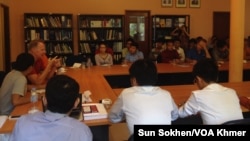An unexpected new trend has begun to emerge among Cambodian youth—organizing public events that aim to improve social development and to solve social issues.
Most are students, and while they may not have training or experience in setting up events, they possess the commitment to put their time and effort into working with others to get an event off the ground.
Lok Sopharith, 20, is vice president of the Student Commission at Phnom Penh’s Royal University of Fine Arts (RUFA). He was involved in organizing “Talent and Achievement,” an annual exhibition of RUFA students’ work, which ran for three days in April this year.
Sopharith told VOA Khmer that holding such an event is not easy.
“We have to plan our goals clearly: What is the aim of this event? What can we do, and how can we make it happen?” he said.
Organizing the event helped to build good lines of communication between students across the school’s faculties, he said, requiring students to work together to overcome obstacles.
“For example, when it comes to making a decision in a meeting, we have to figure out why some people deny our decision while others agree. Then we can find a solution that fits for both sides.”
In the same spirit of promoting Cambodian arts and culture, another event, Bonn Phum, is also being organized by youth annually.
The event, which gives opportunities to aspiring Cambodian artists, attracted about 3,000 participants this year, three times the number who attended last year. This year, Bonn Phum took place in ancient pagoda Wat Preaek Thloeng, 11 kilometers from the capital, just ahead of Khmer New Year.
A co-founder and festival director of Bonn Phum, Rithy Lomorpich, 22, said that organizing the event involved leading a team by sharing a vision and gaining the team’s trust.
“As a leader, I have to be open minded and let my co-workers express what they want to do,” she said. “A leader doesn’t just have to lead, but has to listen and accept members’ ideas.”
Lomorpich said that she faced challenges getting financial support for the first Bonn Phum in 2014, but she managed to succeed with her clear vision to organize the event and the team.
The idea for the event came while Lomorpich was working on her thesis at the Royal University of Phnom Penh (RUPP) and was working on a documentary film about Lakhorn Sbek Thom, a traditional Khmer form of Shadow Theater. She later formed a group called Plerng Kob and cooperated with a local radio station to hold the first Bonn Phum.
Neak Chandarith, director of international studies at RUPP, said that organizing public events was a good way for students to learn about writing proposals, managing people and team building.
“We just guide them a little bit, and they can perform well. They can do everything from design, gathering members and communications and can start from organizing local events to international events,” he said.
The trend was also helping to foster leadership skills, he said.
“They can use their leadership to organize effectively,” said Chandarith. “For youth, they should have the spirit of working in a team in order to discuss about the problems and find solutions. The leadership skill is not just about leading, but observing the situation and contributing.”
The trend for young people to organize events themselves comes amid increased youth engagement in charity events. Future leaders find in such activities an outlet for their energy and a way to hone leadership skills while setting up events.
Ros Vutha, 26, a teacher at RUPP and a co-founder of One Ticket One Child, an event that raises funds for the Kantha Bopha Children’s Hospitals, said he wanted to show younger students that they could contribute to the good of their country.
“We want youths to think that they can do something that can bring impact to their society when they are still students,” he said, adding that he was entrusting the One Ticket One Child event to students to organize this year and next year.
He said the students just needed a little bit of knowledge about how events are organized as encouragement. “We are just giving them advice,” he said.
Aside from local events, Cambodian youth have also put together regional events like the Asean Festival 2015, which was organized by a team of nearly 100 young people to promote culture from across the 10 countries of the Association of Southeast Asian Nations, from food to traditional games to performance.
One of the lead organizers, Heng Sonya, a third-year student majoring International Studies at RUPP, said that among other challenges, it took time for his inexperienced team to get commitments from sponsors.
“If we need to organize an event, we need to have a realistic plan that makes it possible to take place. We should do it step by step and not rush,” he said. “If [people organizing events] do not know what to do, they should ask for advice from experts in this field. Like my team: We needed advice from our teachers to do it.”
Professor Sombo Manara, deputy director of history at RUPP, said it was positive that “nowadays our youths know what they want to do for their nation.”
“I am proud for them that they have produced such good events,” he added.




